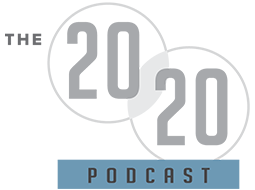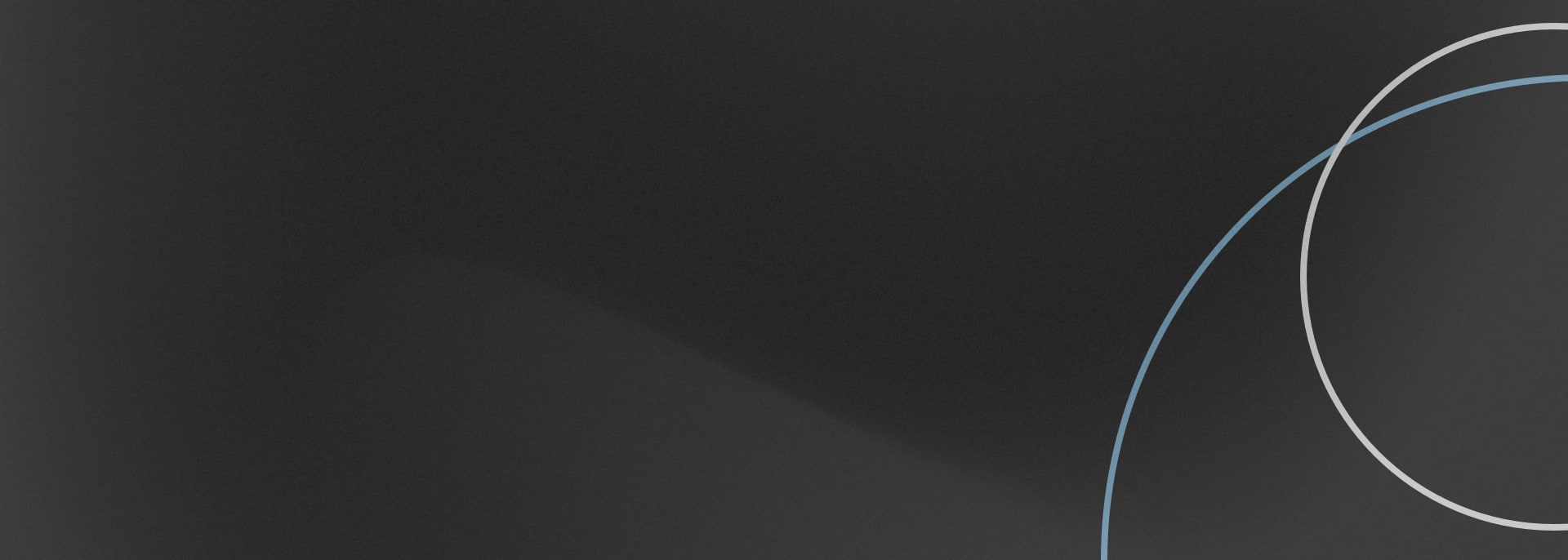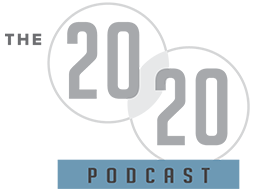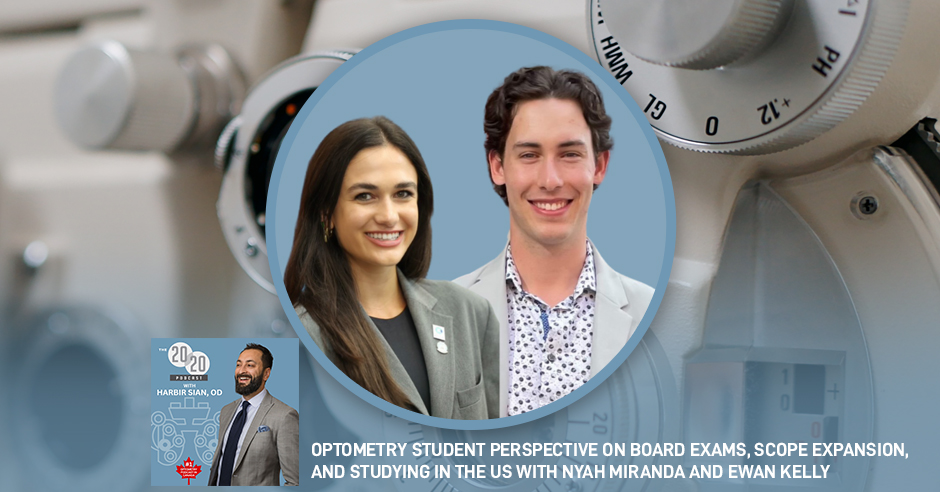
With so much change in the geopolitical landscape and in the world of optometry, it is natural that many current and prospective optometry students may be worried about studying in the United States. In this episode, I sat down with two current students at the New England College of Optometry, Nyah Miranda and Ewan Kelly, about their journey as pre-optometry and current optometry students. Learn about what life is like in Boston and how NECO is supporting students through these tumultuous times.
Big thanks to NECO for providing space and organizing these conversations!
Connect with Harbir:
—
Watch the episode here
Listen to the podcast here
Optometry Student Perspective on Board Exams, Scope Expansion, and Studying in the US – Nyah Miranda and Ewan Kelly
Thank you so much, as always, for joining me around the show to learn and grow. I always appreciate all the support. As always, I have a big request right off the top. If you get any value from this conversation or any of the other conversations, please do share it. Put a screenshot up on Instagram and tag the guest who’s in it, put a link on LinkedIn, or send a link to your friend. Call your mom or whoever it is. Let them know we’re having these conversations. We’re helping the profession to grow, improve, and thrive in the future.
I am grateful to be here. I’m sitting here at the New England College of Optometry in Boston. I have all sorts of nostalgia coming back to me here as I’m visiting NECO. I am very fortunate to be able to record a couple of episodes. I recorded one with Dr. Howard Purcell. If you haven’t seen that one, make sure you stay tuned for that.
I’m also recording this one with two lovely guests. I’m excited to be able to speak to students here at NECO as well as to learn about NECO life and, in particular, Canadian students. What is it like for Canadians to come down here to NECO, and what has the experience been like? I have the wonderful Nyah Miranda and Ewan Kelly here to share their experiences. They’re both in their third year. Why don’t we start with Nyah? Tell us a little bit about yourself.
I am a third-year student at NECO. I’m originally from Vancouver Island, British Columbia. A fun fact about me is that I used to play field hockey in undergrad.
Thanks for having us. My name’s Ewan Kelly. I’m from Halifax, Nova Scotia. I’m a third-year student at the New England College of Optometry. I did my undergrad in London, Ontario, at Western. I’m enjoying my time in Boston so far. It’s been great.
You’re also an athlete.
Correct. I played on the golf team for a couple of years and am trying to continue as we go.
That’s awesome. We can take a tangent and speak about sports this whole time, but given where we are and given that NECO has given us this space so graciously, we should maybe focus. Let’s start with, you’re both Canadian from opposite ends of the country. One island on the West Coast. Is Nova Scotia an island?
It’s an island.
It’s all the way on the opposite end. It’s close enough. I know. This is terrible. I’m ignorant of maritime geography. What I want to ask you both so far is, why did you choose NECO of all the potential other options for optometry schools? Let’s start with Nyah. Especially coming all the way from the West Coast, what made you choose New England College of Optometry?
Choosing NECO As An Optometry School
Coming from the West Coast, I wanted to experience a different culture. Being in a city was important to me. I was drawn to Boston for its multicultural aspects, being in a big city, having all those different opportunities. I thought that NECO would be a good place for me because of the vast Canadian population there.
I was connected with a few doctors in Vancouver. If you know Dr. Sonny Bular, he was a mentor to me. He went to NECO and raved about it, and said, “You get such a good clinical experience there. There are a lot of Canadians and a lot of fun to be had.” Through word of mouth, I became intrigued by checking out NECO. I had my interview, and it was unlike any interview I had for optometry school. Everyone was so focused on grades or OAT scores, but NECO cared about me as an applicant and my aspirations for becoming an optometrist. They seemed like they could work with me to fulfill my full potential as a doctor. A bunch of aspects drew me to Boston. I thought it would be a great place to get my doctoral degree.
NECO students graduated with a lot of clinical experience. Previous grads felt very well-prepared when they returned to Canada to begin practicing.
That’s very good.
I could say the same with me. I heard it through the grapevine. I worked as a tech for a couple of years back in Halifax before I decided to come to optometry school. Since Boston is quite close to Halifax geographically, there was a pretty good network of doctors back in Halifax that all had good things to say about NECO. I’d been to Boston in the past, and I liked the city. Going through the interview process, everybody here seemed supportive. They were reaching out. If you had any questions at all, you’d hear back from them very quickly. It seemed like it was a good place to be, and there were people there.
You guys went through that experience a couple of years ago. It was many years ago that I was going through that same interview process. I feel like I had the same experience going through the interview. I remember sitting down, having a conversation, and it didn’t feel like an interview. It was more of a personal conversation and understanding what my values were, what I like to do back home, and that kind of thing. It is very interesting that NECO still takes that strategy when interviewing. They must be looking at the academic side as well, but they’re taking into account what other traits and values you have that you’re bringing to the school.
Going on a bit of a tangent here, but that’s so valuable as to what it is going to look like for the profession. If we’re interviewing, we need to have a certain baseline academic achievement at that level. If we’re interviewing and accepting applicants based on well-roundedness, personality, and other contributions that they’ll make to the profession in the long-term, that’s better for our profession in the long-term.
If everybody comes out and is book smart, we won’t have the people who are going to be out there, speaking about the profession, the charisma that we need to endorse a profession, and to attract more students in the future. Good on NECO. It certainly seems like they’ve picked a couple of great candidates in you two as well. If you don’t mind me asking, and you’re welcome to share as much or as little as you want, did you apply to other schools? I know you talked a little bit about why you chose NECO. Without speaking poorly of anybody, were there other things that you were looking at that made you choose NECO versus another school, perhaps versus not just the city? Let’s start with you, Ewan.
Hearing from multiple docs back in Halifax, NECO students came out with a lot of clinical experience when they graduated. Speaking with previous grads, they said they were very well prepared when they went back to Canada to begin practicing. For myself, that was a big draw. I wanted to get a lot of experience and get in early. We got in in the first year and started seeing vision screenings with young patients. The exposure was a big part of why I chose here.
That’s lovely. That’s great.
The Clinical Experience At NECO
To add onto what Ewan was saying, too, we are in a city, so you get to see a lot of ocular disease that you might not see in some other areas. The population in Canada, some places are quite healthy. Being in the city, you’re exposed to a lot more different cases that you might not be able to see. That’s one great thing about NECO, too. Echoing what Ewan said, we are thrown into clinic in the second year. We do vision screenings in the first year. They tell you to go for it. You learn on the job, and it’s a great opportunity. I certainly feel a lot more prepared in the clinical aspect going into my fourth year, thanks to NECO.
Do you guys have any community health center experience yet?
Yes.
We do.
I’m at Lynn. It’s an hour away.
I did my stint at Dimock for a bit.
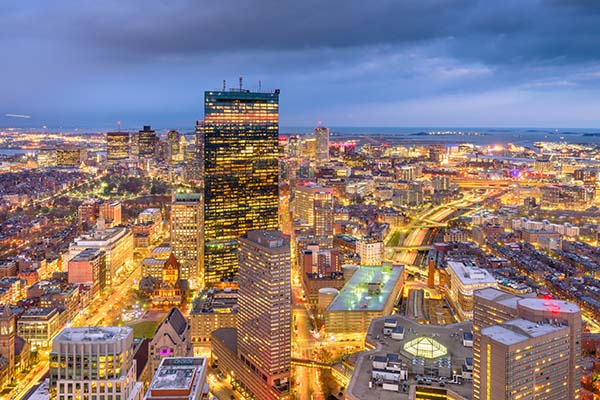
That’s where you start to get your real clinical experience. I’m reminiscing. I’m sitting here and having all this nostalgia about my time here. When you have to take a train and then another train, and then a bus, that starts to add to some of the lessons that you’re learning, living in a new city, and that kind of stuff. I do remember one of the clinics. I don’t remember where it was, but that was the process, green line to red line to a bus or something. I can’t remember what the exact process was. In your fourth year, you’re going to be in a community health center at some point as well. You certainly do start to see a lot of disease and things like that, and get exposed to it. That’s good input.
This is a sensitive topic, I know, because it’s fresh, but I want to hear your guys’ thoughts on NBEO and OEBC. Let’s talk about it from the beginning. There have been some recent changes. I’m not sure how much that affected you, Ewan, but we’ll get into that. To quickly set the scene here, in March 2025, British Columbia and Ontario colleges both announced that they’re no longer taking NBEO as equivalent to the Canadian board exam. Let’s start with when you applied to NECO, when you started here, what was your plan as far as board exams? Let’s start with Nyah.
Board Exam Plans (NBEO Vs OEBC)
I offer a unique perspective. I am from BC. BC was accepting the NBEO at that time. I initially didn’t know what I wanted to do, if I wanted to do a residency or if I wanted to stay in the US and come back to Canada. It was a little bit up in the air, so I decided to keep all the doors open and take the NBEO. I thought that with my class, everyone would be studying for the same thing. It makes sense with the timeline of the school.
I thought that would be the best route of action for me. Unfortunately, my year is the last year that BC will be accepting the NBEO. I do feel sad for the year below me who have purchased their boards prep and have to decide if they’re going to take just the OEBC or if they’re going to take both. It adds a layer of complexity to the situation.
This is what I wanted to get a sense of. You’re coming from different parts of the country, so you may have come to the school with different plans for how you were going to approach this. Nyah, your plan was given the scope and the way the lay of the land was, you’re going to do NBEO because it will allow you the opportunity to potentially work in the States if you want. Also, you had a very clear path to come back to BC. Ewan, what about your case?
When I first came down here, I knew for sure at some point that I would end up back in Canada. When Halifax or Nova Scotia didn’t accept the NBEO, I knew I was going to write the OEBC at some point. However, I wasn’t sure if I was going to try to stay in the States for a year after and potentially do a residency. I was originally open to doing both when I first applied. As I progressed through and got to this point where we are, I decided that maybe a residency isn’t for me, and I do want to go back to Canada, so I ultimately decided to do the OEBC.
At what point along the path did you decide you were not doing the NBEO and only OEBC?
It came upon us when they presented it to us in 2024.
It was well before any of this stuff. It hasn’t changed your path, Nyah, because the third-year class is the last to be able to use MBEO as equivalent. I imagine you have friends in the second year. If you could put yourself in their shoes, what do you see in Nyah Miranda, who happens to be the equivalent of Nyah Miranda in second year? I know there’s only one Nyah, but somebody else like yourself in second year who is from BC and was planning to do MBEO and come back to BC, how are their plans changing? What do you think they have to do?
I would have to take a look at my situation and think about whether I wanted to stay in the US or not. I’m pretty certain, after going through my three years, that I want to go back to Canada anyway. If I had this knowledge in second year, I’d probably do the OEBC, to be honest, especially with the uncertainty that arises. Maybe taking NBEO additionally, but I would definitely make sure I take OEBC as my number one because I do, at the end of the day, want to come back home to Canada. That would be priority number one for me.
That makes sense. Somebody who’s in their 2nd year or 1st year, if they are 100% set on coming back to Canada, they’d be like, “Let’s plan to do the OEBC and focus on that.” If they’re getting to their third year and they’re still not sure, I assume they would have to do both to keep their options open.
That’s a financial burden, too. It’s not cheap to take the NBEO, especially with American dollars. There’s also an investment that goes into buying two different prep sets, too, because they are pretty different tests. Without discussing the materials, they’re fundamentally different. It’s unfortunate. It makes it a lot more complicated for the students. If you are undecided, you should try to think about doing both and best managing them. This upcoming class will be a trailblazer to this experience. I hope NECO and the regulatory boards are able to provide clarification and support to these students as they navigate this change.
It’s a great segue. My next question was going to be for Ewan. We can’t dictate what anybody does. I know NECO, after having spoken to Dr. Howard Purcell, is very open to feedback and input from students, alums, and everybody. What input would you give to NECO? How do you think NECO can support second years who are trying to make these decisions? Let’s say they’ve decided, “I’m only going to do OEBC.” What support can NECO provide to that student who’s studying in the USA? Most other students around you are planning to take the NBEO. What would you need from the school to help you?
Optometry is a lifelong learning profession; your education doesn’t stop as soon as you graduate—it continues.
They come up with policies and different things along the way. If NECO can stay up to date, be able to provide them with good information without the student having to dig in and search for it themselves, and be a good resource that way would be very helpful for Canadian students. Even potentially providing a network of recent Canadian grads to get their input on.
With regards to boards, people who have taken the Canadian boards to provide them with information are important. That’s a great point. If you’re planning to go back to a certain province, are there NECO grads in that province who can provide you with a little bit of a roadmap of what their journey was like and support? That’s a great answer. Anything you want to add to that, Nyah?
To add, it’s important that NECO continues to advocate on behalf of its students to put into perspective what the students are experiencing, because this is a lot of change that’s going on. Looking back, it might’ve been nice to have a grace period or a year of transition instead of imposing these drastic changes so quickly.
Going forward, how can we keep the well-being of the students in mind? Having voices like Dr. Purcell and Dean Weissberg speak on behalf of Canadian NECO students to these boards is important. That is a funneling process through CAOS. Getting student feedback and then feeding it to the higher-ups in NECO to make sure they’re giving the student perspective is super important.
There are two people specifically at NECO, Jill Cummings and Dr. Riley, who have done a great job of giving us all the information about NBEO and OEBC. They’re very accessible. They’re knowledgeable. They’re also putting on a cumulative practical for us to try to simulate the environment of part 2 or part 3 to get us used to what it’s like being in maybe not an exam room clinical setting, but more of a testing facility. They’re doing a great job of presenting us with everything that we need to prepare us.
Part three is the clinical. You’re in an exam room type setting, and you have to do it with a patient in front of you. Is that right, or is that NBEO part three?
Yes.
You’re doing OEBC. Is that part of the OEBC as well?
Yes. I’m not sure if we do it on actual patients or if it’s modelized. They changed a good portion of it. It’d be nice to figure out exactly with this cumulative practical what to expect, rather than going into a testing facility for a big exam and having no idea.
Going into it blind. Whoever’s taking OEBC this 2025, part 1 and 2, is this the 1st time, and you guys will be the 1st people to experience this new version of the exam, or did they change it in 2024?
They changed it in 2024. We’ll be the second.
There are some students or graduates who have taken the new version of it that you could potentially speak to. Something else you wanted to share on that?
As you can tell, there are a lot of complexities and differences between the OEBC and the NBEO, but Dr. Riley and Jill did a good job of breaking it all down for us. We’ve had a couple of different presentations during the evening where they go through all the different registration dates and the differences between the two exams, especially highlighting the OEBC for Canadians and the changes as well. It’s great that NECO has been on top of informing us of all the changes and making sure we’re well-equipped to decide what we’re going to do and be fully prepared going into the process.

That’s excellent. That’s good to hear that they’ve been that thorough with it, not simply updating you on what’s happened, but helping you now prepare moving forward. A quick change of pace, did you know that it used to be NUENCO?
Yes, I do remember. When we met, you kept saying NEWENCO.
Not me. Maybe Sonny did. Sonny graduated a few years ahead of me. When he was here in the early 2000s to mid-2000s, it was still NEWENCO. I don’t know why. All of a sudden, that came to mind. We keep saying NECO. We still talk to some grads from a little bit earlier than my time, and they’ll say NEWENCO. Along that path of this conversation, you had briefly talked about residency. I wanted to get your take on residency. Two questions, and whoever wants to take it first. Are either of you planning on doing a residency? The longer part of that is, how did you come to that decision to do it or not to do it?
Residency Decisions In Optometry
I am not doing it personally. Coming to that decision, Optometry is a lifelong learning profession. When we get back to Canada and get on the job, you’re going to have to continuously be learning and seeing cases. It’s not like your education stops as soon as you graduate. It keeps going. That sense, for me, was enough to get back to Canada and try to start practicing. I’m excited to start practicing as well.
That’s a fair point. How about yourself?
To add to that, one great thing about choosing your fourth year rotations after getting a little taste of everything in 2nd and 3rd year with our community health centers and specialties that we rotate through, I was able to choose sites that I was more passionate about for 4th year. I’m interested in cornea and contact lens, so I chose a lot of sites where I can see scleral and GP contact lens patients. That’s a great thing, too. You can tailor your fourth-year experience to something you’re more passionate about. Speaking to a lot of graduate students is adequate preparation for being a doctor and practicing back in Canada.
Another thing we can touch on is that residencies aren’t as advertised in Canada as they are in the US. I believe you’re not supposed to advertise yourself as a specialist in Canada, if I’m saying that correctly. In that sense, it is a little bit discouraging to spend another year working on this accreditation that you can’t use back in Canada when you can tailor your fourth year experience to focus on what you want and also continuing to learn with CE and different courses as you’re a doctor, which is important.
Those are very valid points towards why you chose not to follow or pursue a residency. You’re right. To echo what you’re saying, if you choose your clinical fourth-year sites intentionally, you can likely get a ton of hands-on experience in a specific area and help you feel comfortable enough to then apply that knowledge when you go back home, wherever that might be.
You can always get trained in a lot of these spaces afterwards, whether it’s CE, workshops, or other things you can sign up for. To your point about specialty, you’re not allowed to call yourself a specialist. That term specialist, unfortunately, is reserved for medical specialists, like a retinal specialist or a glaucoma specialist. Optometrists are not, unfortunately, allowed to use that term as far as our practice goes.
I know, thankfully, there are people advocating on our behalf within our profession to change that vernacular a little bit, but for now, we can say that we specialize in a certain area or offer specialty care services. We can’t call ourselves specialists in a certain area. That is important. We have to be careful how we word it. There are relatively new organizations coming up in Canada that are helping Canadian optometrists get certified, at least be able to call ourselves certified in a certain space, within a Canadian organization equivalent to your academy in the USA.
I did not do a residency either. To play devil’s advocate, there can be a big benefit to those who do pursue a residency if you are intentional about which residency it is and how it’s going to apply wherever you go back to practice. Many years ago, if somebody did a glaucoma residency, I’m not sure it would’ve been all that useful in BC Now, it can be more useful. We have our colleagues back home who are specializing more in glaucoma. We’re able to bill for it, test for it, and all these kinds of things.
Contact lens, cornea, and the anterior segment are things that are more applicable back home. If you were to do a residency in those areas, it still can translate and may benefit that person when they go back home, as far as what job they get as an associate doctor or if they open up their own practice, things like that. There are arguments on both sides. It’s great to see that you guys have thought it through and you were intentional with your decision-making. I certainly can’t say that I was when I was in your position, I was like, “I’m going to go back home and work. Let’s see what happens.”
The Role Of Optometry Residencies
That’s the great thing about our profession, though. One shoe doesn’t fit all. Some people you know will be great in a residency. If you’re passionate about a super niche topic like vision therapy, that can certainly be beneficial coming back to Canada. The same path can’t be for everyone. These are our specific paths, but that doesn’t mean that doing a residency is wrong or not doing a residency is wrong. It’s about the individual and what path you choose to pursue.
The same path isn’t right for everyone. It doesn’t mean doing a residency is wrong, or not doing one is wrong. It depends on the individual and the path they choose to pursue.
That’s beautiful. Thank you for putting it so eloquently. You should become a host. You’re better at it.
There are enough podcasters in my family.
I was going to say there are never enough podcasts, but there’s already one in your family still. There’s room for more.
Shout out to Trevor.
Shout out to Dr. Trevor Miranda and the Optometry Unleashed podcast. He’s great. Travis is good on any mic or any camera. It doesn’t matter what the format is. Thanks for the input on the residency. I want to zoom out a little bit to NECO again and Canadian students. How have you felt has NECO helped Canadian students feel at home here in Boston, in the United States? Are there certain programs? Are there certain events? What have you seen or been a part of?
Canadian Students At NECO And The CAOS Club
We have a CAOS chapter here at NECO. It’s the Canadian club. We have over 140 members. It’s one of the biggest, most active clubs on campus. I’m lucky enough to be a part of the leadership group there. We host a lot of great events throughout the year. We connect students through our school and also with our extensive Canadian alumni network.
We host different events. We had Canadian Thanksgiving. We were able to host all the students and have a turkey dinner. A lot of students weren’t able to go home for the holidays. Little events like that to make our students feel more at home here are great. The CAOS Club is a big thing. A lot of Americans come up to me and they’re like, “Nyah, can I join CAOS?” We have a fun time. We have great dinners. We have great events. I love being a part of CAOS. That’s something I’m super passionate about.
That’s amazing. We’ll talk a bit more about CAOS in a second, but Canadian Thanksgiving is an awkward time if you go to school in the States. Isn’t it around midterms and stuff like that, or is it close to?
It felt like right before midterms or something like that.
It’s tough. Down here, we didn’t get time off for it. Our families are back celebrating. It’s nice that NECO does put on the Canadian Thanksgiving for it. It allows us to all get together and feel like a Canadian family.
That’s awesome. That’s cool. 130 or 140 students part of CAOS at NECO alone is incredible. It’s amazing. It’s cool to hear and mindblowing because, back in my day, CAOS was much smaller, or whatever it was called, if it was called CAOS back then, the Canadian Students Club, or whatever it was. I remember being part of it, and I remember 2 or 3 people who were advocating for it and trying to lead it, but it was still a very small thing. It’s cool to hear how much it’s grown and how much support there is for Canadians. Tell me more about getting involved with CAOS. How did you get involved? How would a prospective student in NECO get involved? How has it been beneficial?
To start, we have a club fair at the start of every year. As a first-year student coming in, I knew initially I should probably be a part of the Canadian club because there are so many clubs on campus, but they have a strong group in CAOS. I felt like they welcomed me in. I got to know students of all different years as well. You tend to stay in your own year if you don’t join these clubs.
Having the perspective of the upper years was super helpful in navigating my career here at NECO because I was able to hear their hindsight. That was helpful. A lot of them, what path they chose, what rotations, and where they want to go back to practice in Canada. This was super important for me because I wanted to stay connected with the Canadian population while studying in the US, because they will be colleagues one day. This was my way to stay connected to my colleagues while studying in America. It was a great experience. It all started at Club Fair.

This is great. There are newer things that are happening that are helping students to be more involved. Ewan, are you part of CAOS?
I am part of CAOS. I’m not part of the leadership of CAOS, but I am a member. I go to almost all of the events. They are fantastic.
That’s good to hear. How do you feel it’s benefited your time here at NECO?
Moving down here, not knowing anybody I came down here with, everybody was very outgoing, nice, and welcoming. As a friend group and people to lean on, CAOS was great to offer that. They give a lot of insight into things going on back in Canada that someone in 1st or 2nd year optometry school may not have as much exposure to. They get to hear these things and hear from different industry partners, and give a good sense of what is happening back home.
Scope Expansion
That’s good. For any prospective students who may be reading this, coming to NECO, or if there are other students here who are not part of it, I would recommend CAOS. It seems like it’s something that provides a lot of support. That’s great. Let’s change gears a little bit. I want to talk about scope expansion.
Whenever you guys come back home, whether it’s Nova Scotia or BC, you’re going to start to hear more of these conversations if you haven’t already. This term scope expansion, we’re trying to change the terminology a little bit to scope modernization or scope optimization, because it sounds a little bit more friendly and more positive. First of all, have you heard much talk about this while you’re here at NECO? Have you heard much of this happening back home?
Yeah. It’s definitely a pretty popular topic. However, it’s hard to find out a lot of details regarding it when you’re a student not part of your residential college.
How about you, Nyah?
I joined the BCDO as a student. I’m subscribed to their monthly newsletter, so I got a little bit of information on the proposals for scope modernization in BC. It’s nice to be aware of that. As a NECO student, I had the opportunity to go to the Massachusetts State House with the MSO and be able to speak to legislators about pertinent bills that involve optometry and educate them on our profession.
That was a great opportunity as a student and a unique opportunity that NECO provided for me. It’s important to be aware of the scope expansion and the state of optometry in the US because the US is almost leading this expansion. Canada tends to follow it. Being aware of these changes will certainly be helpful as I transition back to Canada.
Another thing to recognize, too, is that our curriculum is taught to the highest level of scope expansion in the US. We are fully trained at the highest level, such as injections, lasers, and minor procedures. We are fully educated in this, and we can be prepared to practice to these standards when the scope is expanded in Canada. That’s great. That definitely puts us at an advantage studying in the US.
A lot of credit to NECO for the level of training that you’re coming out of school with. You know the term education before legislation. We need to be able to show legislators that we are trained to this level. You’re coming out of school trained to the fullest level. The fact that you also have had the experience of going to the State House.
It was great. It is educating senators on our profession because a lot of people don’t know the medical aspects of optometry and all that we can diagnose and treat as optometrists. That’s a great experience, and also for students to realize that these legislators and senators are people like us, too. It’s not scary at all. I feel confident as a graduating doctor that I’ll be able to continue my passion for advocacy by maybe joining being a part of the BCDO, continuing this scope modernization and practice that I hope the profession continues to grow in that direction, and being a part of it in whatever way I can. Having this experience that NECO provided me with will be great for the future.
Having the perspective of upper-year students is super helpful in navigating your career.
That will be hugely valuable for you. Having exposure to it, in general, is going to be hugely valuable. We need that. When you go back to work, whether it’s Nova Scotia, BC, Ontario, or wherever, you need that passion for the profession to want to advocate. If you have that under your belt as a little bit of experience already, it’s going to be hugely valuable to you.
It comes back to best serving our patients. If we have the ability to treat these conditions and provide this care for our patients, it is a disservice to them not to be able to provide these services, especially in rural communities. I’m from a rural area on Vancouver Island where a lot of these resources aren’t available. I am hoping that this will change in the future.
That’s definitely the first step. This has been a great conversation. I appreciate you guys coming out of lab or whatever you’re doing and coming here to chat with me. This is not just for students. This is also for our colleagues out there, the optometrists. Wherever you’re practicing, get a look at the current students, what they’re doing, and what they’re learning.
If you can get more involved with your school, whether it’s NECO, Waterloo, or wherever you might have gone to school, help current students get the training to the fullest level. Have more enthusiasm for the profession, so they’ll come out of school and want to advocate for the profession. Nyah and Ewan are two perfect examples.
If you’re reading this, call your school up and say, “I’m an alum. I’d love to help. I’d love to connect with the students.” Give them a bit of your time to talk to them about what it’s like to practice wherever you live. When they come back from the States, they want to come back to Saskatchewan or wherever because they know more about it, and they have their questions answered.
Nyah has had the luxury of having the BCDO communicating with her, but not every student has that. Somebody from Nova Scotia could chat with you and others. Let them see what the scope of optometry is like back home. Any final words? I want to give you guys a minute or two each to share thoughts about your time here at NECO and optometry in general. Any final words of wisdom or whatever you’d like to share? I’ll start with you, Ewan.
I’d like to say a big thank you to everybody at NECO. In my time here, I’ve learned so much valuable information. I’ve enjoyed it. It’s nice to be able to be educated to the highest standard and take that to pioneer optometry, heading back up North.
Nyah?
If you come to NECO as a student, definitely take advantage of all the different opportunities here. I feel like NECO has so many different clubs, different organizations, and different paths that you can pursue. It’s about what you make of the profession. What we need is a lot of passionate students who are willing to advocate for our profession and are excited about the future.
If you’re a prospective student, don’t be afraid to reach out to me, Ewan, or any other students at NECO. I feel like that’s how you get the best advice or the tea about the school, so to speak. Reach out to students. Doctors are helpful, too, but if you reach out to people who are at the school currently, they can give you the best insight as to what it’s like. I’ve certainly enjoyed my experience here. It’s not over yet. I’m grateful for the support that NECO has provided to me as a Canadian and also as a student.
I appreciate you guys taking the time. Both of you have provided such great insight into student life, the changes that are happening, and all of that. Thank you very much for taking the time. I want to say big thanks to NECO for having me here, allowing the students to be on the show, and having this amazing setup and all of this. I have very fond memories of being a student here as well, and my time in Boston. I’m grateful to NECO for all of that. Thank you to everybody who’s tuning in to the show. I’ll see you guys in the next episode.
